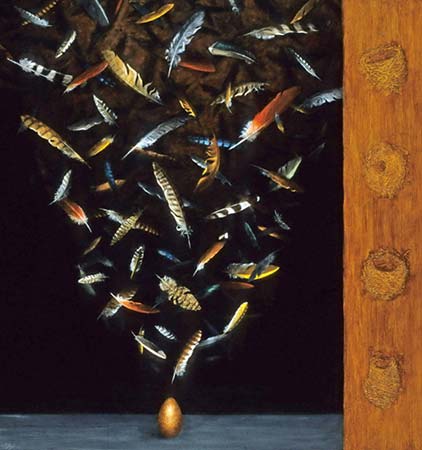Lisa Cihlar: I belong to a lovely online poetry group on Zoetrope.com. We write poetry together every Sunday and do 30 poems in 30 days quite a few months of the year. I asked them to give me some questions for this interview. Many thanks to these wonderful poets for taking the time.
*************
GC Smith: Your poetry seems rooted in the land. Was your youth and nurturing in rural Wisconsin, or are you a transplanted city girl?
Lisa: I grew up in rural Wisconsin. Most of that time was spent on a four acre farmette in Door County which is the thumb of Wisconsin that sticks out into Lake Michigan. We lived in the middle of a cedar, cattail, and willow swamp. My chapbook “The Insomniac’s House” is very rooted in that landscape. We had little red-bellied snakes and blue spotted salamanders show up in the basement now and then. I was a tadpole collector from a very young age. I also climbed a lot of trees and tucked into their crooks because I loved that view. Trees feel very safe to me.
Marie Lynam Fitzpatrick: How old were you when you wrote your first poem and did you always want to write?
Lisa: In the fourth grade I won a poetry contest with a poem that I remember began: Flutter flutter butterfly. The rest is lost, but I do suspect it was not very good.
I really wanted to be a novelist from a very young age. I wrote so many false starts over the
years that it makes me cringe. In 2007 a friend of mine suggested I write a poem for some sort of challenge and the blocks fell into place. I quit trying to write a novel (a thing I was not good at) and began writing poetry with some serious intent. I had an early acceptance by an online zine called Wicked Alice and I have never looked back.
Paul W. Murray: I can’t ask one single question. Sorry. There’s a complexity that makes your stuff wed joy and darkness; astral bewilderment with the baser elements of our earth, and yet, they constantly connect (often in webs.) In over half a decade here (on Zoetrope), you have merrily forced me out of the analyst’s booth.I’m just a fan.
Lisa: Thanks Paul! There may not be a question here, but there is an answer. A mentor of mine—Terri Brown Davidson—told me to take two disparate things and put them together in a poem. That sounds simple, but it makes for some weird /images. I have been known to ramble on a bit before getting to the point. If there is a point really. The poems I write are strongly based on /images. I have a tendency to study things closely. When I was a kid we always drove the same route into town. I challenged myself to notice one new thing that I had never seen before along that route on every trip. I must have been a weird kid! Still, I bet if I was challenged, I could tell you about almost every house along that drive and probably get many of the trees right.

Marty Lopez: Why is the chicken your favorite farm animal? If not what is? No, only kidding. In terms of wedding surrealism with nature, can you discuss your vision, how it compares to other poets who have similar outlooks?
Lisa: Marty is joking here about chickens because whenever I do a month of prompts I always include a chicken prompt. They make me laugh. And you would be surprised at the creative chicken poems my poet pals have come up with.
As to surrealism—I never liked anthropomorphism. Then I started doing it. But my talking animals are not meant to be taken literally. They are stand-ins for people I suppose. I love talking bears and wolves. In the poem r.kv.r.y. published in this issue, a girl climbs a tree and starts to become part of the tree. Obviously not going to happen in real life, but the idea charms me. In the yard of the house where I live now there is a little wooded area. Some of the trees have pieces of rusted barbed wire grown into them. (The land here used to be cow pasture.) I am fascinated by that. I like that trees are that malleable. In my darkest hours when I suppose that humans are going to become extinct due to our own foolishness, I am cheered by that fact that in the end I think the earth will be fine without us and nature will fill the vacuum. It will begin with the trees.
I read a lot of prose poems and poets who write in this form are attracted to surrealism. Not always, but the form seems to give them permission to experiment with it. I think they are surprising and fun to read.
John C. Mannone: I noticed your prose poem style (and length) is ubiquitous. I too like this form. Tell us how you have settled on this as apparently your favorite form. And how do you resist a good line break? LOL
Lisa: Sometime late in 2010 I got a copy of The Rose Metal Press Field Guide to Writing Prose Poetry. It sparked something in me. I think I like the shape of prose poems as little boxes filled with wonderful things. I still write lined poetry once in a while, but not often. (Here comes the most sacrilegious thing I will say.) I think line breaks in free verse are so arbitrary that they are often meaningless. If you are working meter or end rhyme poems, that is not the case, but free verse? I don’t know—I am probably wrong, but when I read lined poems aloud, and prose poems aloud, they sound the same to me, and wasn’t poetry originally an oral art? (I feel as if I am going to get hate mail for saying that.)
Linda Manning: What inspires you?
Lisa: Obviously nature is number one, but also people. My second chapbook, This is How She Fails, is all about an unnamed character—she—who is losing parts of herself. I happen to have MS and I’m in a wheelchair fulltime, so I never really wanted to look at the psychology of that theme too closely, but I like the character I created. Swampy Woman is the main character in the other chapbook and I love her over-the-top, take no prisoners, style. She is sexy and opinionated and unapologetic. I am also inspired by other poems and poets.
Carlene Grimshaw: Out of all the poets, past and present, who has inspired you on your poetry journey? Which poet, do you think, inspired you the most? And why?
Lisa: Traci Brimhall has written an amazing book titled Rookery. I have a platonic crush on her and she has no idea I exist. Isn’t that the way of the world? LOL! Brigit Pegeen Kelly makes me so jealous with Song that I turn green whenever I read her book. But there is a poem, “Testy Pony” by Zachary Schomburg, that breaks my heart every time I read it. If you want a good cry, search it out. In fact here is a link. I read it again while looking up the link and I still get gooseflesh. What a masterful use of language. Darn him. Now I feel inadequate again. Then there is “A Story About the Body” by Robert Hass. Wow! From the past, I can never get Yeats and T.S. Elliot out of my head. You have to read poetry to write poetry, I think, and I read a lot of it.
A final general question—Where can someone find more about your work?
Lisa: I should put together an author’s website. Since I have yet to do that, here are the links to the two publishers where you can get my current chapbooks: http://dulcetshop.ecrater.com/p/13370012/the-insomniacs-house-lisa-cihlar and http://press.crisischronicles.com/
Also, if you google my name you will find dozens of my poems that were published in different online zines.


You are the best, a poet extradinnoire.
Amazing to think that so much can be accomplished – so much intriguing verse written – in only 6 years! I continue to thank David Barger for breathing the name, Lisa Cihlar. And I am always thankful for the chicken that’s “sacrificed” for one of Lisa’s poems. AND… this interview is very enjoyable and insightful…for that I am also thankful.
Obviously, this is not “hate mail.” Yet, I am inclined to speak of lines and breaks. 🙂
As for free verse and prose, lines and spaces are not to be meaningless, or used quite haphazardly, as many often do. But with the same care that grammar and punctuation should be utilized in a critical work, these tools of verse serve great purpose.
When I am about to read aloud a poem – be it prose/free verse or lined with meter and even rhyme – those wonderful breaks SHOULD show me where to pause for others to ponder, to contemplate even briefly, to garner the poet’s intent expressed in that captured moment – be it of insight, emotion, ballad, imagery, or any of the myriad of possibilities a poet may dare to venture. I must admit, I am thankful for those little lines and breaks. It seems they serve me well, as I truly need all the help I can get when following the path another mind has trail-blazed.
Lisa, your trails are fascinating journeys and inspirations for writing!
Lisa, I am awed by your poetry. You make me think, laugh and cry – or just clap my my hands delighted like a small girl who has just seen something surprisingly beautiful. There isn’t one I haven’t enjoyed. Thank you.